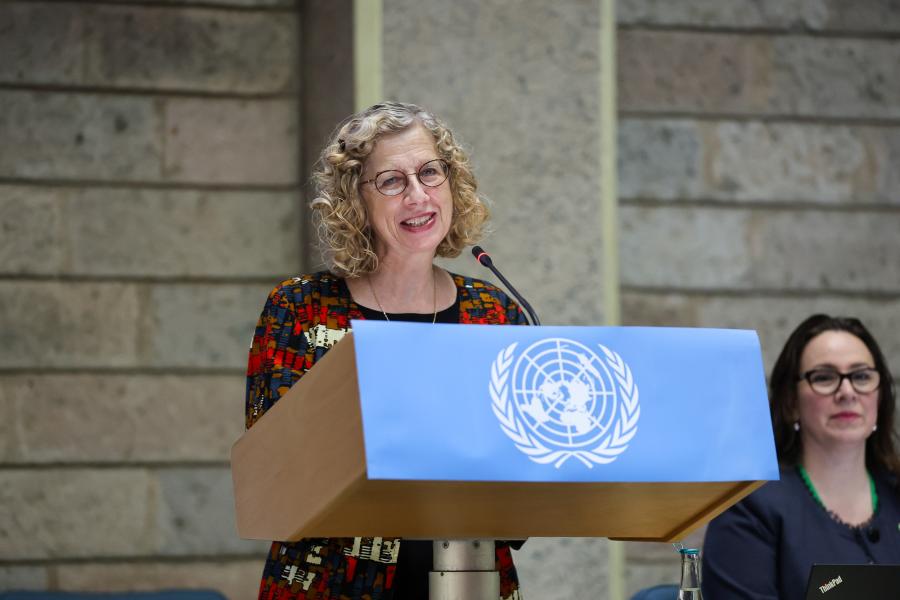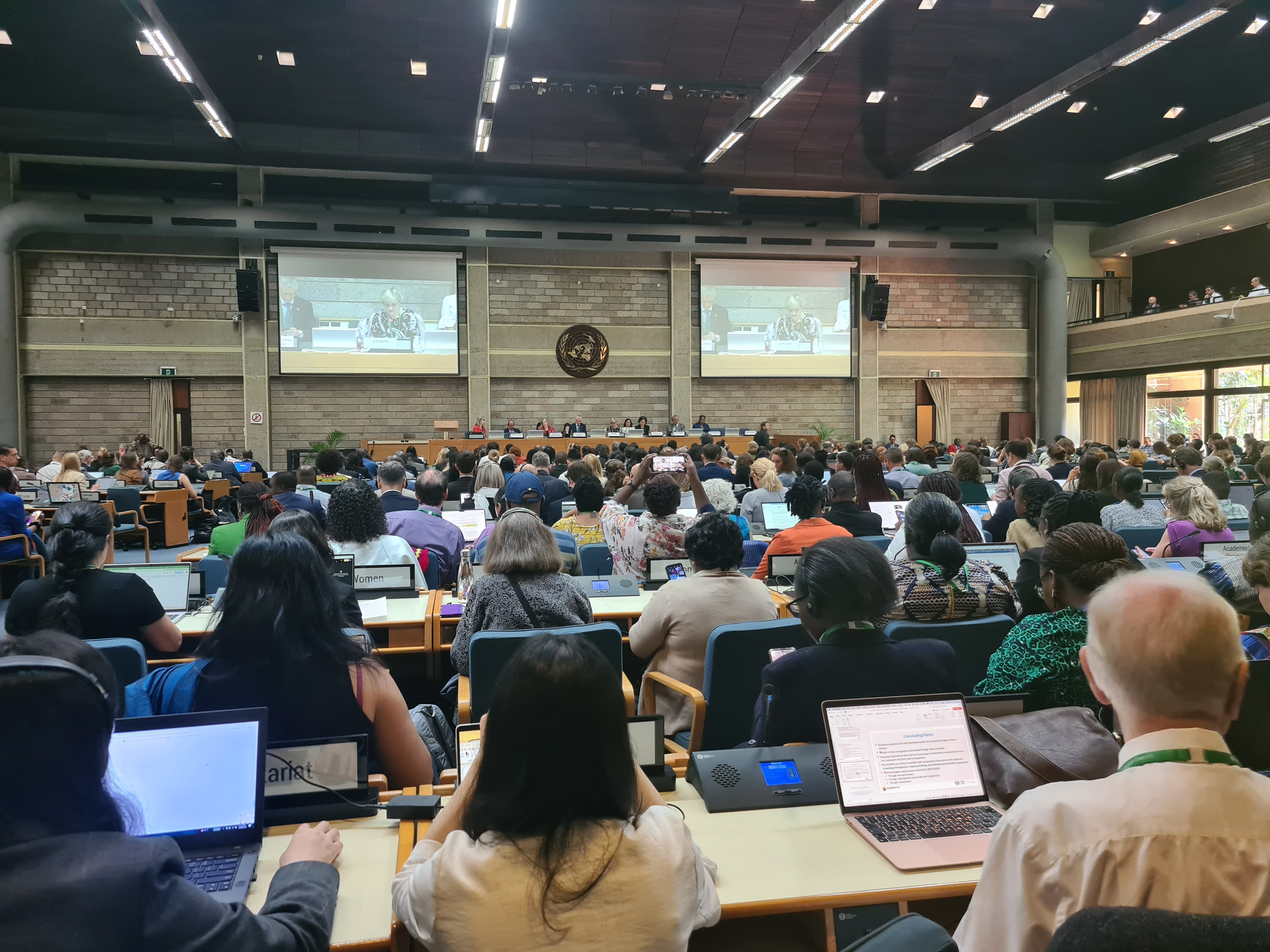Story
Accelerating global biodiversity efforts: key themes from the recent UN advisory meeting in Kenya
22 May 2024
PML’s Professor Matt Frost reflects on the 26th SBSTTA meeting
 Above: Coral reef in Malindi, Kenya
Above: Coral reef in Malindi, Kenya Over 1400 international delegates convened in Nairobi in mid-May for the 26th meeting of the Subsidiary Body of Scientific, Technical, and Technological Advisors (SBSTTA) of the United Nations Convention on Biological Diversity (CBD).
The SBSTTA is designed to bridge the gap between scientific research and policy-making, ensuring that decisions made under the CBD are informed by the best available scientific knowledge and technological advances. The CBD itself was agreed by world leaders at the 1992 Earth Summit in Rio de Janeiro with the primary aim of maintaining ecological health during economic development.
Attending the Nairobi meeting – which was held at the headquarters of the United Nations Headquarters in Africa (also HQ of some of the UN’s global programs including the Environment Programme (UNEP)) – was PML’s Professor Matt Frost.
Here, he reflects on some of the key themes of the conference:
Implementation: The Need for Urgency
Under the Kunming-Montreal Global Biodiversity Framework (adopted at COP15), a series of 2030 targets for the CBD were established. These include:
- Conservation of Ecosystems: Protecting at least 30% of terrestrial, inland water, coastal, and marine areas by 2030 through ecologically representative and well-connected systems of protected areas.
- Species Protection: Halting the extinction of known threatened species and promoting the recovery and conservation of these species.
- Sustainable Use of Resources: Ensuring that the harvesting, trade, and use of wild species are sustainable, safe, and legal to prevent overexploitation and minimize impacts on ecosystems.
- Pollution Reduction: Reducing pollution from various sources to levels that are not harmful to biodiversity and ecosystem functions, including significant reductions in excess nutrients, pesticide risks, and plastic pollution.
- Invasive Species Management: Controlling and eradicating invasive alien species, especially in priority sites such as islands, to reduce their impact on biodiversity.
- Climate Change Mitigation: Minimizing the impact of climate change and ocean acidification on biodiversity through mitigation, adaptation, and disaster risk reduction actions.
- Integration of Biodiversity in Policy: Integrating biodiversity into policies, regulations, and planning processes across all sectors to ensure sustainable development and poverty eradication.
“This urgency stems from the widely recognized triple planetary crisis (climate change, pollution and biodiversity loss), which requires immediate and concerted efforts from all parties involved to address. A push for rapid implementation of the GBF is needed in order to avoid the historical trend of unmet biodiversity targets.”
During the meeting, there was discussion of the recommendations of the Ad Hoc Technical Expert Group (AHTEG) on indicators for the Kunming-Montreal Global Biodiversity Framework. PML's Professor Steve Widdecombe provides marine expertise to the AHTEG and there was much appreciation expressed by various countries of his work.
Alignment: Synchronizing Efforts Across Agreements
In her opening remarks to the Nairobi meeting, Executive Director of the United Nations Environment Programme (UNEP), Inger Andersen, emphasized the necessity of a “whole-of-government, whole-of-society approach”.

Above: Inger Andersen, Executive Director, UNEP. Image credit: International Institute for Sustainable Development.

Above: View of the room during the morning plenary. Image credit: Professor Matt Frost
With that same sentiment, the meeting highlighted the necessity for alignment between the CBD and other international agreements, particularly the Biodiversity Beyond National Jurisdiction (BBNJ) agreement, which addresses high seas conservation.
Professor Frost said: “Harmonizing approaches with regards to issues including monitoring, indicators, and methodologies between the CBD and BBNJ is critical for a unified global approach to marine and coastal biodiversity conservation. Having the CBD and BBNJ dealt with in a way that is not coordinated or out of sync in terms of timing could undermine the effectiveness of both initiatives - so it’s vital we get this right.”
Capacity Building: Bridging the Resource Gap
Capacity building emerged as a significant theme, with many countries expressing concerns over the resources needed to meet their biodiversity commitments.
Professor Frost stresses that this challenge is not simply about the finance:
“Capacity building goes beyond financial aid; it involves extensive training and technical support – everything from a need for localised workshops on monitoring and data management, through to improving the ways in which indigenous knowledge can be incorporated into scientific frameworks.
Disparities in resources among countries pose a challenge in a myriad of ways – even in terms of these international discussions, with wealthier nations able to send larger delegations to meetings, while poorer nations sometimes struggle with minimal representation.”
Capacity-building was also an area of discussion during a side event led by the Ocean Climate Platform (with PML as a partner) with the title "Global Biodiversity Framework Delivery: A Blueprint for a Nature Positive Future for our Ocean".
Professor Frost joined a distinguished panel moderated by Marine Lecerf of the Ocean & Climate Platform and which also included David Obura, Chair of the IPBES (The Intergovernmental Science-Policy Platform on Biodiversity and Ecosystem Services); Pauli Merriman, Head of Policy, Global Oceans Practice, WWF; Florent Merle, Deputy Director, European and International Relations, French Office for Biodiversity; Alfred Ralifo, Senior Policy and Government Affairs Manager, WWF-Pacific; and Farah Chaudry, Head of Marine CBD, Defra, UK.
The event was held in the main UN conference room and focused on a range of issues with Professor Frost highlighting the need for alignment of activity across conventions including marine indicator development and reporting. Professor Frost also spoke about the importance of capacity building and systemic issues that need to be addressed in order to ensure proper representation in support of delivery of the GBF.
Conclusion: A Call for Collaborative Action
The discussions at the UN biodiversity meeting underscore the importance of a coordinated, well-resourced approach to global biodiversity conservation.
Implementing the Global Biodiversity Framework with urgency, aligning international agreements, and building the capacity of all nations are essential steps toward achieving the 2030 targets.
As Professor Frost urges, “the path forward requires both immediate action and strategic collaboration to protect the planet's biodiversity effectively.”
| About International Day of Biodiversity The 22nd May 2024 marks the International Day for Biological Diversity, a day proclaimed by the United Nations to increase understanding and awareness of biodiversity issues. This year, its theme is “Be part of the Plan” - a call to action to encourage governments, indigenous peoples and local communities, non-governmental organisations, lawmakers, businesses, and individuals to highlight the ways in which they are supporting the implementation of the Biodiversity Plan. |
Related information
Informing Biodiversity Restoration: PML at the 25th SBSTTA